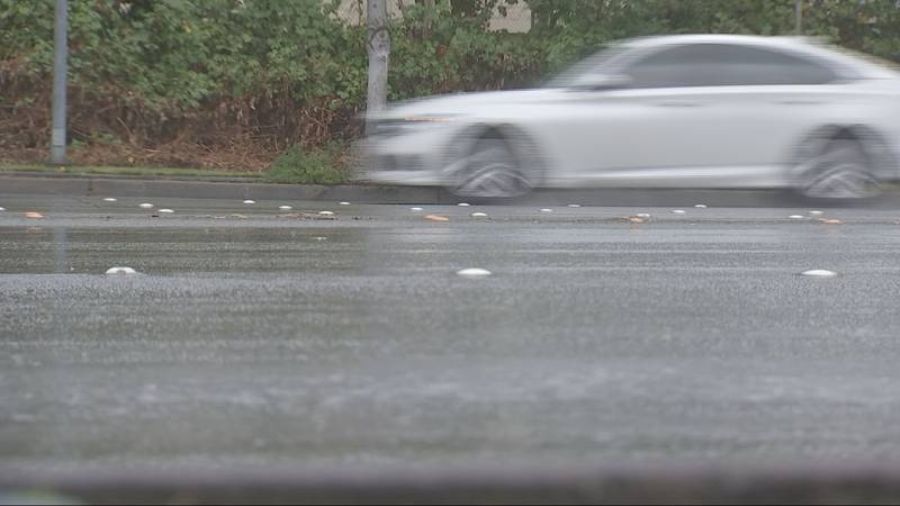UW Medicine’s head of Virology: Live market ‘more likely the start’ of COVID
Nov 28, 2021, 7:27 AM

In this Feb. 6, 2021, file photo, a worker in protective overalls carrying disinfecting equipment walks outside the Wuhan Central Hospital where Li Wenliang, the whistleblower doctor who sounded the alarm and was reprimanded by local police for it in the early days of Wuhan's pandemic, worked in Wuhan in central China. (AP Photo/Ng Han Guan, File)
(AP Photo/Ng Han Guan, File)
Scientists have been trying to trace the actual origins of the virus that causes COVID-19 for a while now. For a time, some thought that it was possibly partially engineered as part of a lab experiment but there’s some new information in now that points toward the origins being at a live animal market.
Dr. Keith Jerome, head of UW Virology, told Seattle’s Morning News that he thinks this is going to be the next chapter in a story that’s going to go on for a while.
“We want to understand where the virus came from because we’d like to be able to prevent it next time,” Jerome said. “If it came from a market with live animals, that’s important to know for controlling it. And of course we’re interested in, did it come from a lab? Because that’s also a really bad thing and we need to know.”
Snohomish County health officer: Fifth COVID wave ‘unlikely’ to be the last
The latest findings on the origins are in a new paper from an evolutionary biologist at the University of Arizona named Michael Worobey. Worobey basically looked through as much data as he could find and tried to piece together what happened around the Wuhan market in China, Jerome said.
“The idea was that maybe we were kind of tricked by this market thing because the word got out that it was coming from the market,” Jerome explained. “We looked there hard and that’s where we found all the cases. Basically, [Worobey] looked at cases that were found before word got out. So trolled around different hospitals and essentially found that of about 20 early patients, 10 had something to do with this market, particularly places that had some live animals. It’s something called a raccoon dog, and they can carry coronaviruses, so it sort of fit that the market was there.”
“[Worobey] also found out a little bit more about this so-called first patient that kind of made all this complicated because there was an idea that this 41 year old man had COVID on Dec. 8 and was the first case,” Jerome continued. “It turns out that on Dec. 8, what he actually had was some tooth problems and his COVID symptoms started on the 16th. So he wasn’t the first case.”
That’s important to mention and to know, Jerome says, because that man had nothing to do with the market. So now, this puts the first case as a vendor at the market on Dec. 11.
“That’s the earliest case we know,” Dr. Jerome said. “It makes us think that the market is more likely the start of this. In my opinion, it’s certainly not a cut and dried case. And that’s why I say, I think we may get some more chapters as people keep looking at this and try to figure this out — we sort of peel back the layers of this onion.”
The situation is China is very different than that of the United States, Jerome noted when asked if there are people at the live animal markets looking for the next virus. While there are U.S. scientists, and people in the media, and people who work independently and get to disagree, have their own ideas, and research them to get the truth, Jerome points out that things are a lot more controlled in China.
“There are no samples from those animals, for example, those were all destroyed,” he said. “The area where they were was all disinfected before any sampling was done. So we really don’t know for sure — it was just done differently.”
So while there are these groups of people looking out for the next virus, Jerome says they’re probably not able to do it as well as they could in another setting.
As for how COVID-19 got to humans, the hypothesis is still that the virus got between bats.
“We know that bats carry coronaviruses, and we know that bats have coronaviruses that are very, very similar to SARS-CoV-2, but there are some important differences,” Dr. Jerome said. “So the prevailing idea has been that there must have been some sort of intermediate species — that it went from the bat, into something, and then into people. Was it the raccoon dog? You can make a nice story of it. Is there proof? No.”
“You have lots and lots of these animals in a confined area,” Jerome added. “Maybe one has been, let’s just say as a hypothetical, it’s been exposed to a bat. Now these raccoon dogs are housed together by a vendor, they’re passing it between each other. The vendor is caring for them, handling them, and so forth. So is the vendor bitten by them, licked by them, just breathing the air? Those are the big questions we really don’t know.”
“I think live markets are inherently dangerous for this sort of thing — this is a recurring story,” Jerome said. “I’m not sure that there’s a way to make these live markets be safe ideas, frankly. I think it’s a very difficult thing.”
That said, this is not something that would be likely to happen to an individual pet.
“It seems very, very unlikely,” Jerome said. “Is it impossible? No. But I wouldn’t worry about about a bat biting my dog. That is that is the last thing — virus or not — that I’m going to worry about for the rest of the day,” Jerome said.
New therapeutics
Since the vaccine came out, there have been a bunch of new therapeutic drugs for people who either didn’t get vaccinated or who have breakthrough infections, or for whatever reason.
“I think it’s a huge deal,” Jerome said about the medications. “We’ve seen the hesitation around the vaccine. I mean, my goodness, the easiest way for this — or most health conditions — is to prevent them first. Usually that’s what people argue for. But we’ve seen a lot of hesitancy around vaccine, unfortunately.”
“And once you get COVID, you’ve heard these stories, people want to get the vaccine and it’s too late at that point,” he added. “Then you’ve got things like the monoclonal antibodies and so forth that are incredibly expensive and you have to get an IV.”
These new drugs are exciting, Jerome says, because they work well and they’re pills.
“In the early data, they prevent the risk of hospitalization — depending on the drug — between 50 and 90%. So they keep people out of the hospital, and they keep them from dying,” he said.
This, Jerome noted, is a huge advantage for breakthrough cases, people who haven’t been vaccinated, and especially for people across the world in places where they still don’t have access to vaccines.
Mercer Island MD explains why we’ll likely need yearly COVID booster shots
As far as when to take the pill, Jerome says sooner is better for almost any antiviral.
“We’re thinking around the first four or five days after symptoms start, and sooner is better,” he said. “I think what you’re going to see is these get approved and really rolled out widely. If people are in an elevated risk for COVID, they’ve got a cough, they’ve got some reason to think about that they may have COVID, get that test. And if it’s positive, you can get on these drugs and hopefully prevent this from becoming a life-threatening illness, which it certainly can today.”
To clarify, these will be prescription drugs, not provided over the counter.
Listen to Seattle’s Morning News weekday mornings from 5 – 9 a.m. on KIRO Radio, 97.3 FM. Subscribe to the podcast here.














